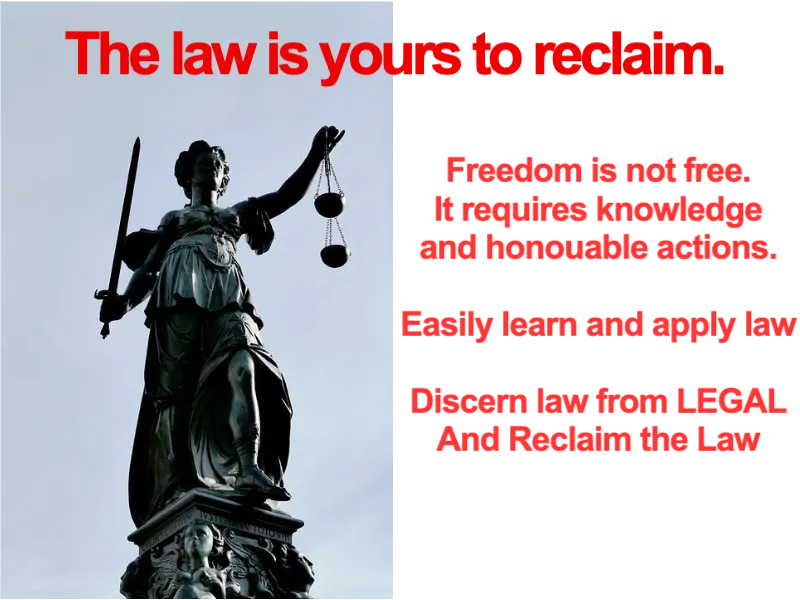LEGAL vs law: know the difference or pay the price
There is "law" and there is "LEGAL" and knowing the difference can be the difference between living in freedom or voluntarily waiving your full rights for limited rights and LEGAL PRIVILEGES and LEGAL BENEFITS that can change at the whim of any OFFICIAL decree. Some of the PRIVILEGES and BENEFITS you may be OK with, the diminishment of rights not so much.
Note: On this website we will use ALL CAPS whenever using a word or phrase is from the LEGAL jurisdiction rather than law. The use of wo/man is short hand equal to man or woman.
LEGAL vs law? Are they different?
Yes. Big difference.
The "law" exists as foundational principles of life, living, nature that are unchanging that can be generally agreed to as being true. Lawful is based on fact.
You exist at law and under law before LEGAL comes into the picture. Every day you have access to and protection to law, every day you are subject LEGAL because of the applications.
LEGAL is a copy, imposter of law, not based on fact but designed with the intent of creating LEGAL FICTIONS, LEGAL ASSUMPTIONS/PRESUMPTIONS/DEEMING in order to create a LEGAL world designed, controlled, administered, argued, judged by LAW SOCIETY members worldwide. Nothing happens in society, business or general life without LEGAL touching it and influencing it.
LEGAL is made up from fictions, ideas, concepts, whereas law is real. FICTIONS like a CORPORATION, it is a creation of the STATE, which cannot give real life only the appearance of life/existence, known as an ARTIFICIAL PERSON but it can only occur at the request/application of a man, known as a "natural person" or "private person", the power that gives life to the ARTIFICIAL PERSON.
In LEGAL everything is a TITLE with defined RIGHTS, OBLIGATIONS, PRIVILEGES, DUTIES, punishmentS for OFFENCES AGAINST A STATUTE (not against a wo/man). Almost anything other than your given name or simply man/woman is a TITLE in the LEGAL world. PARENT, CHILD, DOCTOR, LAWYER, JUDGE, FARMER, TEACHER etc. being TITLES that people use and therefore fall under, are subject to, the LEGAL jurisdiction of limited rights in exchange for PRIVILEGES and BENEFITS, OBLIGATIONS and DUTIES.
STATUTES are not laws. The law is from mankind, from the people, common sense, agreed behaviour, common law in a society or law between wo/man and wo/man. STATUTES are from the STATE, a LEGAL FICTION which at all times must recognize and protect common law rights and private rights of mankind.
Maxim of Law:
Quid fas non veritas est.
legality is not reality.
The law is the common law and it is the foundation of justice for mankind. Laws serve man and woman equally, written or spoken in plain language. Laws defend our unalienable rights, provide reparations to the injured, and through them we can live in peace and harmony with other men and women. The law is the definition of the people's power, and is common sense. The law protects living men and women from harm, loss, and fraud.
LEGAL STATUTES, written in LEGALESE, are the EN-ACT-MENTS (ACTS) of the LEGISLATURE that apply to PUBLICLY REGISTERED LEGAL entities as FRANCHISES of the PUBLIC STATE . STATUTES offer limited “LEGAL PRIVILEGES and LEGAL BENEFITS” to “ARTIFICIAL PERSONS” of various kinds, prescribing contract “rules and REGULATIONS” by consent. STATUES can have the appearance of law, but are not law, they are “colour of law”. STATUES govern LEGAL entities as a FRANCHISE benefit to the PUBLIC STATE.
SO: On this website we will use ALL CAPS whenever using a word or phrase is from the LEGAL jurisdiction rather than law so you know the difference and can learn to spot LEGAL vs law right away.
Listen in - A conversation about LEGAL vs lawful.
Maxims of Law
- Consensus facit legem. Consent makes the law. A contract is a law between the parties, which can acquire force only by consent.
- Qui tacet consentire videtur. A party who is silent appears to consent.
- Non videntur qui errant consentire. He who errs is not considered as consenting.
- Disparata non debent jungi. Unequal things ought not to be joined.
- Ei incumbit probatio qui dicit, non qui negat. The burden of the proof lies upon him who affirms, not he who denies.
- Incerta pro nullis habentur. Things uncertain are considered as nothing.
- Falsus in uno, falsus in omnibus. False in one thing, false in everything.
- Quaelibet jurisdictio cancellos suos habet. Every jurisdiction has its boundaries.
Disclaimer Notice
The content of this website is provided for educational purposes, omissions and errors excepted, and is not legal/lawful advice.

